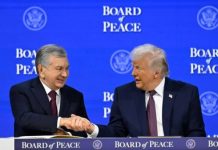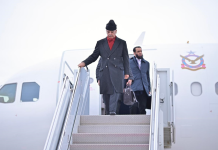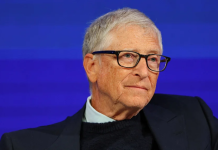Seventy members of parliament sign a letter calling for a ‘change in the defence doctrine’ of the nation.
News Desik
Tehran, Iran – Hardline lawmakers in Iran have once again demanded the country start building a nuclear bomb as Western powers are days away from reimposing United Nations sanctions amid concerns war could restart with Israel.
Led by a lawmaker from the ultraconservative holy Shia city of Mashhad in northeastern Iran, 70 members of parliament signed onto a letter calling for a “change in the defence doctrine” of the theocratic establishment.
The letter, published by the state-run Fars news website, was not directly addressed to Supreme Leader Ali Khamenei because his commands cannot be second-guessed by other authorities. Instead, it was directed at members of the Supreme National Security Council, which is in charge of the nuclear file and includes the president, judiciary and parliament chiefs.
Iran has long argued that its nuclear programme is for civilian purposes and it has no intention of pursuing an atomic bomb, even though archnemesis Israel is known to be the only nuclear-armed power in the region.
The lawmakers argued that a fatwa, or an ultimate religious ruling, issued by Khamenei about two decades ago that prohibits the use of nuclear bombs does not technically forbid building or keeping them as deterrence.
They warned that Israel “has reached the brink of madness”, “attacks without respecting any international obligations and kills innocent people”.
Such rhetoric has intensified significantly among the more hardline elements of Iran’s establishment in the aftermath of Israel’s surprise attacks on Iran in June that triggered a 12-day war and also saw Washington intervene on Israel’s behalf and bomb Iran’s main nuclear facilities.
The European powers, known as the E3, are remaining signatories of Iran’s 2015 nuclear deal with world powers that United States President Donald Trump unilaterally abandoned in 2018 and followed with tough sanctions. Despite strong opposition by China and Russia, which also negotiated and signed the 2015 nuclear agreement, the E3 triggered the “snapback” mechanism of the landmark accord and secured a vote at the UN Security Council last week.
Iranian Foreign Minister Abbas Araghchi arrived in New York early on Monday as the head of a delegation to hold negotiations with European and other powers. President Masoud Pezeshkian will be heading there on Tuesday to participate in the UN General Assembly, which will be heavily focused on Israel’s genocidal war in Gaza and recognition of a Palestinian state.
Last week, Araghchi presented what he called an “actionable plan” to his European counterparts, which media reports said included Iran recovering and diluting its supply of highly enriched uranium in exchange for deferring the snapback sanctions.
The diplomat said Iran was “faced with a litany of excuses and outright deflection, including the farcical claim that the Ministry of Foreign Affairs does not represent the entire political establishment”. He emphasised that he has the “full support” of the establishment, including the Supreme National Security Council.
















